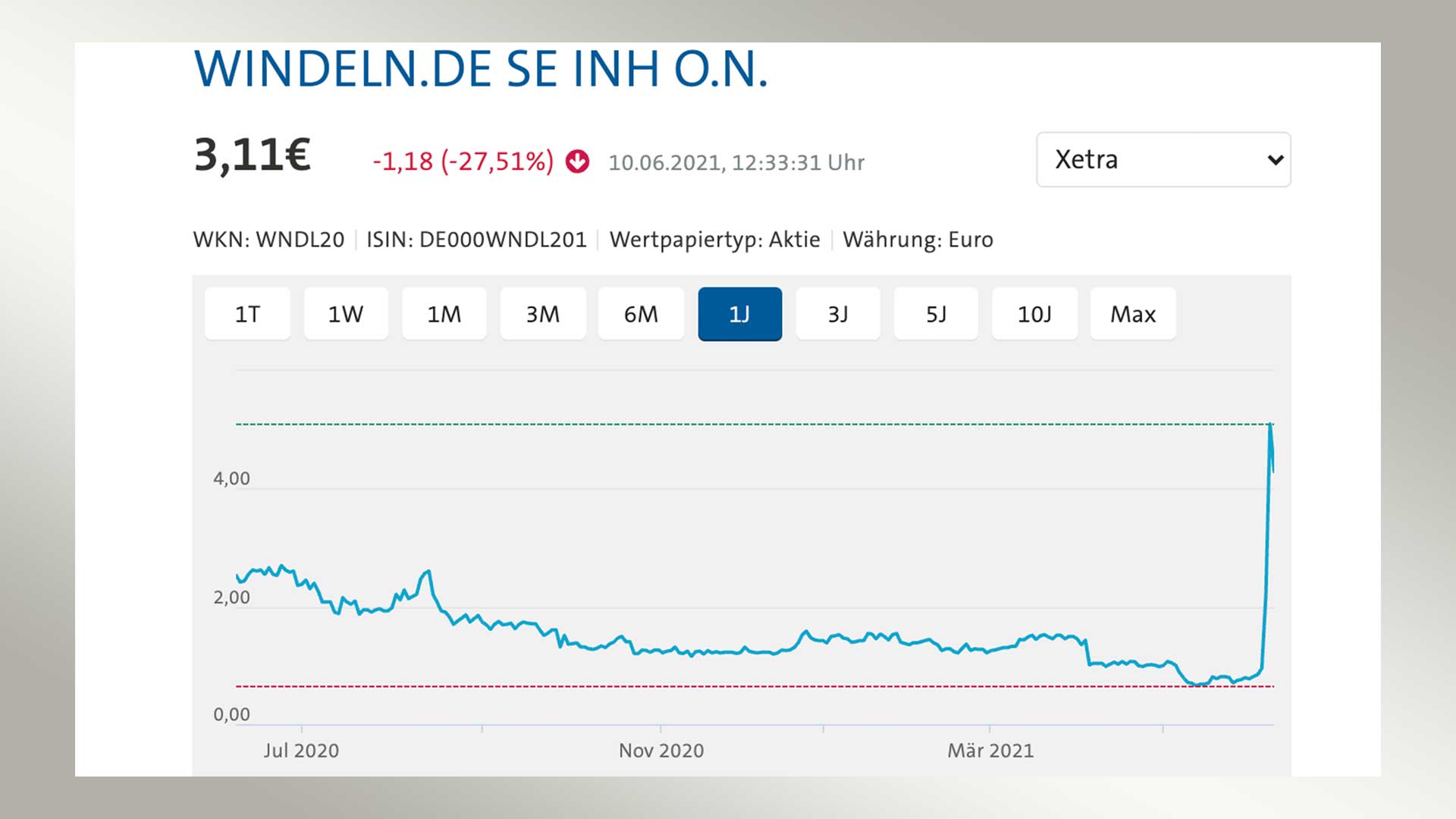 analysis
analysis
Price capers of the Windeln.de share The dangerous game of gamblers
Status: 10.06.2021 6:24 p.m.
Small investors let shares of the baby outfitter Windeln.de shoot up first – then they crash. This risky game is powered by social media. Newcomers in particular make a lot of mistakes. From Angela Göpfert, tagesschau.de From the so-called penny stock to the investor’s favorite: The story of Windeln.de reads so seductively simple at first glance. Within a few days, the paper soared from around 70 cents to 6.92 euros – a staggering price increase of almost 900 percent. The share of the online baby outfitter was not driven by new, positive news about the development of the company, but by a host of gamblers who drum for the company in investor forums such as Reddit and on social media.
Report of loss in April
They drummed for a company that made a net loss of 13.7 million euros in 2020 and officially announced in April that it had suffered a loss of more than half of its share capital. In other words: Windeln.de obviously needs fresh money. The notification of loss was by no means voluntary. Rather, Windeln.de thus complied with an obligation imposed by the legislator: Companies must inform if losses have exceeded a critical limit and there is an urgent need for action.
“Flagpole” as a warning signal
The course of the Windeln.de share seems all the more absurd. Experts speak of such a steep, almost vertical rise in price “Flagpole”. Many stock market beginners are attracted and seduced by such price patterns. One would have loved to have this share, since it would have enabled one to multiply one’s capital in a very short time.
 The so-called “Flagpole” is clearly visible in the Windeln.de chart. Image: tagesschau.de For technical analysts, i.e. stock market experts who analyze price developments and other market data, this is the “Flagpole” but one thing above all: symbol of an exaggeration phase on the stock markets – and thus a clear warning signal. The Federal Association of Consumer Organizations (VZBV) is also critical of the current price developments at Windeln.de, Nanogate, Clover Health, Gamestop and other stocks with particularly noticeable highs: “This has nothing to do with investing, it is pure speculation”, said Christian Ahlers, speaker in the financial market team tagesschau.de .
The so-called “Flagpole” is clearly visible in the Windeln.de chart. Image: tagesschau.de For technical analysts, i.e. stock market experts who analyze price developments and other market data, this is the “Flagpole” but one thing above all: symbol of an exaggeration phase on the stock markets – and thus a clear warning signal. The Federal Association of Consumer Organizations (VZBV) is also critical of the current price developments at Windeln.de, Nanogate, Clover Health, Gamestop and other stocks with particularly noticeable highs: “This has nothing to do with investing, it is pure speculation”, said Christian Ahlers, speaker in the financial market team tagesschau.de .
A “Fireworks” of investor errors
At Mojmir Hlinka from the Swiss asset manager AGFIF International, the alarm bells are ringing when stocks like Gamestop or Windeln.de are mentioned: “These are pure speculative objects, without any substance.” The Swiss expert makes a whole in this context “Fireworks” on the basis of typical investor errors, especially the neglect of the likelihood that certain events can occur. Experts speak of “neglect of probability”. “The tiny probability of making a profit on such stocks is massively overestimated by investors. In contrast, the great probability of a loss is clearly undervalued”, told Hlinka tagesschau.de .
When emotions are involved
Hlinka’s perspective on the markets is a special one, as he operates asset management on the basis of the so-called “Behavioral Finance”. This economic research direction is based on the findings of the psychologists Daniel Kahnemann and Amos Tversky. Accordingly, the investor does not act rationally, but is controlled by his emotions and typical behavioral patterns. As a result, he makes mistakes that reduce his profits. Such a typical mistake has a lot to do with paying attention to certain papers. “These stocks are widely reported in the media, especially on social media”, emphasizes AGFIF expert Hlinka. “This means that more information is available to them more easily. That automatically makes them more interesting for investors.”
Social media fuel herd instinct
Another problem for the normal investor is the herd instinct: Many people like to do what the masses do. “This phenomenon can be observed in any stock market hype. People feel safer in the herd”, emphasizes Hlinka. “Investors’ herd instinct is currently controlled primarily via social media. Quasi real sects are forming in the investor forums.” Consumer advice center expert Ahlers is similarly critical and warns: “Tip givers and sellers can also be found in social networks, who may do more than exchange investor experiences and may also advertise dubious investments.”
Financial regulators advise caution
The German financial supervisory authority BaFin has now recognized this: “BaFin advises all investors to check the information provided on social media very carefully with the help of other sources”According to the agency’s website. “Chat groups in social networks are often only used to entice investors to buy certain stocks so that the senders can benefit from the rising prices of these stocks.” As new as the influence of social media on share prices may be, the mechanisms behind the current excitement about papers like Windeln.de have been well known for centuries. The first big hot topic in financial history was tulip bulbs. Numerous other bubbles followed – from railways, the South Seas, the Internet industry to US real estate, to name a few. “Each of these bubbles has burst so far”, says Hlinka. “History has proven that. At some point this hype will also burst.”
Massive price drops
Perhaps the bursting of the bubble has already begun with a look at some of the shares: Today the Windeln.de share rushes down by up to 35 percent. Clover Health stocks fell 24 percent on the Nasdaq yesterday. When exactly a bubble will burst is difficult or even impossible to predict, even for experts. But the stock exchange world has also found a technical term for this: the “Greater Fool Hypothesis”, according to which prices will continue to rise as long as there is one in the market “even bigger fools” there who pays even more.





























































You must log in to post a comment.